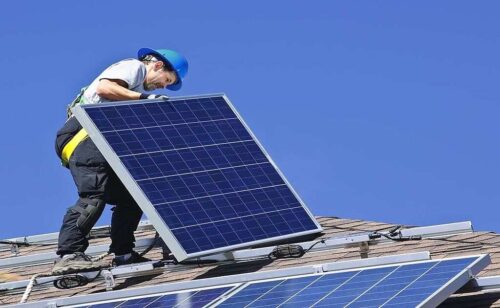Hybrid solar inverters are becoming increasingly popular in residential solar energy systems. These devices combine the functionality of traditional grid-tied inverters with battery storage capabilities, offering homeowners greater flexibility and control over their energy usage. As more people look for ways to reduce their carbon footprint and save on electricity bills, hybrid solar inverters are emerging as a smart solution for modern homes.
How Hybrid Solar Inverters Work
Hybrid solar inverters are the heart of a solar power system, managing the flow of electricity between solar panels, batteries, and the grid. Here’s a breakdown of their operation:
- Solar Power Conversion: The inverter converts DC power from solar panels into AC power for home use.
- Battery Management: Excess solar energy is stored in batteries for later use.
- Grid Interaction: The inverter can draw power from or feed excess power back to the grid as needed.
- Smart Energy Management: Advanced algorithms optimize energy flow based on usage patterns and electricity rates.
By seamlessly integrating these functions, hybrid solar inverters provide a comprehensive energy management solution for homeowners.
Benefits of Using a Hybrid Solar Inverter
Implementing a hybrid solar inverter in your home offers numerous advantages:
- Energy Independence: Reduce reliance on the grid and protect against power outages.
- Cost Savings: Lower electricity bills by maximizing self-consumption of solar energy.
- Flexibility: Adapt to changing energy needs and electricity prices.
- Environmental Impact: Decrease your carbon footprint by using more renewable energy.
- Future-Proofing: Easily integrate with smart home systems and emerging technologies.
These benefits make hybrid solar inverters an attractive option for homeowners looking to optimize their energy usage and reduce long-term costs.
Choosing the Right Hybrid Solar Inverter
Selecting the appropriate hybrid solar inverter for your home requires careful consideration of several factors:
- Power Capacity: Ensure the inverter can handle your home’s energy demands.
- Battery Compatibility: Check if it works with your preferred battery type and capacity.
- Efficiency: Look for high conversion efficiency to maximize energy production.
- Monitoring Features: Choose an inverter with user-friendly monitoring and control options.
- Warranty and Support: Consider the manufacturer’s reputation and after-sales service.
To make an informed decision, consult with a solar energy professional who can assess your specific needs and recommend suitable options.
Installation and Maintenance
Proper installation and maintenance are crucial for the optimal performance of your hybrid solar inverter:
Installation
- Professional Installation: Always hire a certified solar installer for safe and correct setup.
- System Integration: Ensure proper connection with solar panels, batteries, and your home’s electrical system.
- Permits and Regulations: Comply with local building codes and utility requirements.
Maintenance
- Regular Inspections: Schedule annual check-ups to ensure all components are functioning correctly.
- Software Updates: Keep the inverter’s firmware up-to-date for optimal performance and security.
- Cleaning: Maintain a clean environment around the inverter to prevent dust accumulation and overheating.
By following these guidelines, you can ensure your hybrid solar inverter operates efficiently for years to come.
Cost Considerations
While hybrid solar inverters may have a higher upfront cost compared to traditional inverters, they offer long-term savings:
- Initial Investment: Prices vary based on capacity and features, typically ranging from $1,000 to $3,000.
- Energy Savings: Reduce electricity bills by optimizing solar energy usage and storage.
- Government Incentives: Check for local and federal tax credits or rebates for solar energy systems.
- Return on Investment: Calculate potential savings over the system’s lifetime, typically 10-15 years.
To determine the cost-effectiveness for your situation, consider factors such as local electricity rates, solar potential, and energy consumption patterns.
Future of Hybrid Solar Inverters
The technology behind hybrid solar inverters continues to evolve, promising even greater benefits for homeowners:
- AI Integration: Advanced algorithms will further optimize energy management.
- Vehicle-to-Grid (V2G) Capabilities: Integration with electric vehicles for additional energy storage.
- Improved Efficiency: Higher conversion rates and lower energy losses.
- Enhanced Grid Support: Better integration with smart grids for improved stability and reliability.
As these technologies mature, hybrid solar inverters will play an increasingly important role in residential energy systems.
Conclusion
Hybrid solar inverters represent a significant advancement in home energy management, offering a blend of efficiency, flexibility, and cost savings. By combining solar power conversion, battery storage, and grid interaction in a single device, these inverters provide homeowners with greater control over their energy usage and expenses.
As you consider upgrading your home’s energy system, a hybrid solar inverter could be the key to maximizing your solar investment and reducing your environmental impact. With ongoing technological improvements and increasing affordability, now is an excellent time to explore the benefits of hybrid solar inverters for your home.
Ready to take the next step? Contact a local solar energy professional to discuss how a hybrid solar inverter can fit into your home’s energy strategy. Embrace the future of clean, efficient, and intelligent energy management today!


